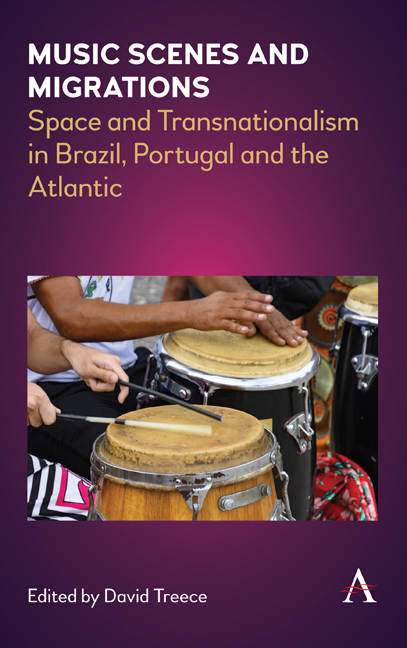Book contents
- Frontmatter
- Contents
- List of Illustrations
- Acknowledgements
- Introduction
- Part 1 Colonial and Postcolonial Transnationalisms, Migrations and Diasporas
- Part 2 Relocating Rio de Janeiro
- Part 3 Demetropolitanizing the Musical City: Other Scenes, Industries, Technologies
- Notes on Contributors
- Notes
- References
- Index
Chapter 9 - The Construction of a Canonical Space for Samba andChoro within the Brazilian Social Imaginary
Published online by Cambridge University Press: 20 January 2022
- Frontmatter
- Contents
- List of Illustrations
- Acknowledgements
- Introduction
- Part 1 Colonial and Postcolonial Transnationalisms, Migrations and Diasporas
- Part 2 Relocating Rio de Janeiro
- Part 3 Demetropolitanizing the Musical City: Other Scenes, Industries, Technologies
- Notes on Contributors
- Notes
- References
- Index
Summary
Introduction
The processes through which individuals and socialgroups elaborate representations of themselves, andthereby construct their narratives of remembranceand self-valorization, are indicative of the ways inwhich people take ownership of a given past, consolidating thoseelements, characters, stories, songs, rituals andworldviews that reinforce their sense of identity.The discursive weft through which a given culturalpractice is legitimized permeates the powerrelations between the social actors involved, and byexamining these power relations it is possible toidentify the strategies adopted by them as they seeksuccessive levels of acclaim in either thematerial/commercial or the symbolic/aestheticrealms.
This chapter focuses on those social representationsassociated with the worlds of samba and choro music,which will be examined following the leadestablished by Chartier (1990); that is, in theirrole as ‘social institutions’, in as far as suchrepresentations are both important touchstones forthe construction of the ‘real’ and key forces inorientating the action of social agents (Ribeiro2005). In so doing, we hope to understand how socialnarratives and practices construct ‘the world asrepresentation’ (Chartier 1990). That is, we aim toassess the capacity of various social actors –musicians, consumers, art critics and experts – tostandardize and re-establish, through theirrespective discourses, the meanings which confer onmusical genres their prominence within the nationalculture (Orlandi 1993).
In the specific case of Rio de Janeiro's independent music circuitfor samba and choro – which occupies severaldistricts of the city, particularly the central andnorth zones – that legitimation has been achievedthrough a complex process of articulation involvingvarious agents who together reinforce the privilegedposition that these musical genres occupy withinshared, if not always consensual, hierarchies inBrazilian society. It is important to note that bothsamba and choro have built that symboliclegitimation by placing great emphasis on their‘tradition’ and ‘past’ (Hobsbawm and Ranger 1997).It is through these ‘memory narratives’ (Bosi, Ecléa1995) that both genres acquire selfvalidation andclaim their prominence within the national pantheon.
- Type
- Chapter
- Information
- Music Scenes and MigrationsSpace and Transnationalism in Brazil, Portugal and the Atlantic, pp. 103 - 116Publisher: Anthem PressPrint publication year: 2020



